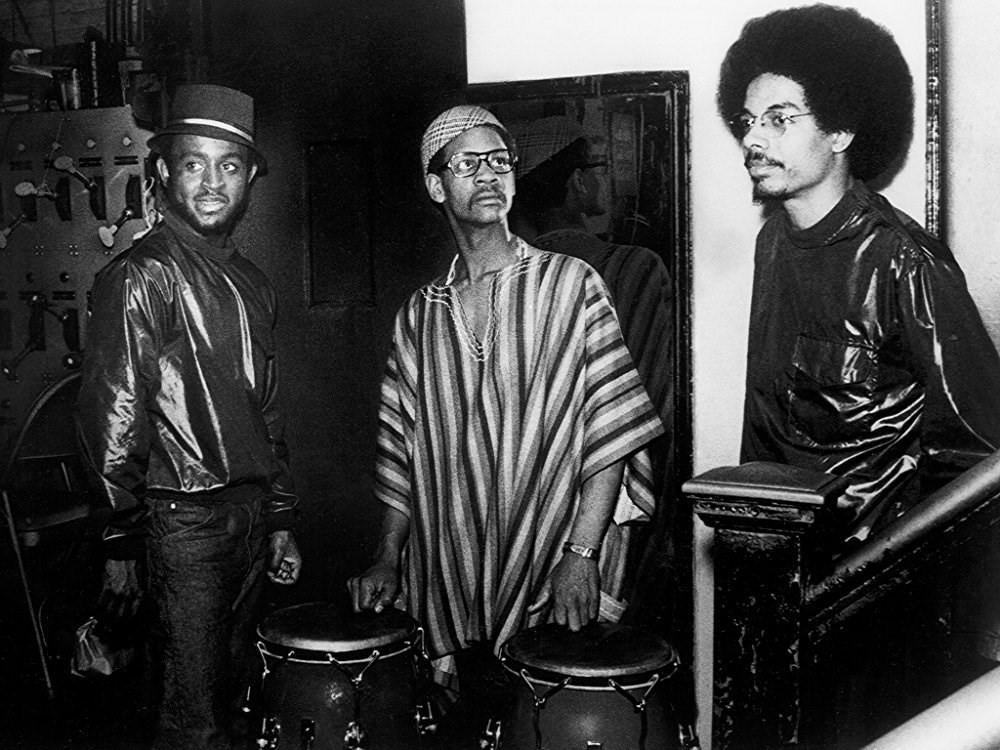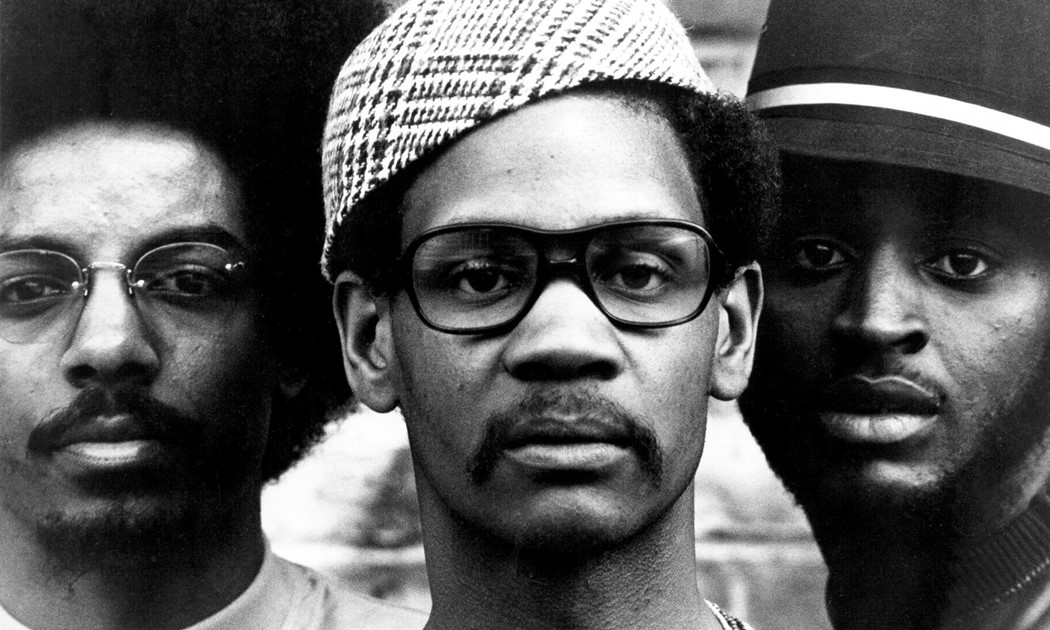The Last Poets Talk Beyoncé, Blackness and Why They Feel Sorry for Kanye
- TextAlex Denney
British poet James Massiah sits down with the godfathers of hip hop, who have just released their first record in 20 years
On a recent trip to the supermarket, Umar bin Hassan overheard a conversation that made him laugh. “I’m out shopping and this little white boy says to his mama, ‘I wanna be a Black Panther, mommy,’” says Hassan, one of the founding members of NYC pavement prophets The Last Poets. “And Poppa’s like, ‘What the fuck is this shit?’ So the kid says, ‘Leave him alone, Daddy, he’s one of my heroes!’ Like, ‘I don’t give a fuck what you think daddy, that picture’s not coming off the wall, motherfucker!’”
No doubt, The Last Poets rallied a few people to the Black Panthers’ cause in their time, though not the same Black Panthers the kid was thinking of (Hassan, for what it’s worth, “loved” Ryan Coogler’s recent Afrocentric blockbuster). The group, whose stridently political, jazz-and-funk-laced poetry was a precursor to rap, found themselves on the FBI’s watchlist for their ties to the insurrectionary political group. But their influence is everywhere in hip hop, where their songs have been sampled by Biggie, Dr Dre, A Tribe Called Quest and Kanye (who helped them win a Grammy for their 2005 track with Common, The Corner). It’s the hip-hop connection that brought their music to the attention of British poet James Massiah, who was blown away when he finally caught them live at London’s Jazz Cafe a couple of years back. “It was like an oration at an ancient Greek amphitheatre – like, ‘This human being has got the floor for the next however long,’” says Massiah, whose own musical ventures include collaborations with Massive Attack and south London newcomer Obongjayar. “No one holds a gun to your head, you’re free to walk out. And it’s almost a battle between how polite you’re gonna be as an audience member and how skilful they’re gonna be as an artist that determines how long you remain in your seat for.”
Now, The Last Poets are back with their first record in 20 years, and their first reggae album full stop: produced by Nostalgia 77’s Ben Lamdin and Brighton producer Prince Fatty, it’s a celebratory set that pays tribute to the enduring power of black music from ragtime to blues, bebop and Prince. But it’s also full of the ferocious intellect that fired their early releases: on America Is a Terrorist, Hassan’s partner-in-rhyme Abiodun Oyewole gives a righteous history lesson that delights in saying the unsayable: “America’s a terrorist, with a slave system in place / to take away the humanity of a darker race”. To honour this most timely of comebacks, we invited Massiah to put some questions to the group and “soak up some of their energy”.
Abiodun Oyewole: It’s been madness since this trip has been booked, we’ve been inundated with interviews. We’ve nothing else to do but run our mouths and what we do on stage is run our mouth, so I hope I wake up with a voice in the morning!
James Massiah: I guess that’s the nature of the beast, you know.
AO: Well… Sometimes I wonder if I’m talking to the beast!
JM: I think in some regards I may well be the beast, as an animal that consumes energy… You guys have done a lot in your time and I’m just here to absorb some more of your energy. First of all I wanted to ask, where do your values come from? Do they belong to any established system, any kind of school?
AO: I think we both have family values. We see each other as brothers – you know, that’s one of the expressions that black people used in the 60s, which I wish people would use now more than ever. Because we’re really all brothers and sisters.
“Beyoncé is a performer, you know, she ain’t done none of the heavy lifting. Neither has Kanye” – Umar bin Hassan
Umar bin Hassan: My grandmother took me and my other six brothers and sisters and my mother into her house, when nobody else would do that. And my crazy daddy went mad and threw rocks through her windows, because she took us in and she was protecting us from him, but my grandmother never gave up on us until my mother was able to get herself together. So she taught us what family values was.
AO: When Umar first came to New York City, I didn’t say, ‘Well, you better find a shelter or some place.’ No, I tried my best to hook up a home for him here, because –
UBH: He did hook up a home! He got me into this hotel, which was dormitories for the black city college students who couldn’t afford to stay on campus. I think black people look at family a little differently to white people. I think (white people) look at it like, ‘You come from my DNA, and you fathered this clan and that clan,’ but we go a lot further out, man. We will include animals into the family!
AO: That’s true. We’re all human beings. If you don’t see your neighbour as somebody that got your back, then why are you in that neighbourhood? You know why we’re seeing more of that tribal, territorial attitude? Donald Trump has made it clear that we gotta get together. Because he is so toxic, he’s trying his best to chop the world into little pieces, because that’s a world that he can manage or control. And that’s not gonna work. People from all walks of life are joining against this man’s foolishness.
UBH: I’m banking on these young kids, from the kids who got shot in these schools through (to) Black Lives Matter, these kids are the ones who will take it further than we did. (Because) they tired of the racial shit, they tired of the economical shit, they wanna live in a country where people can grow up to be who they wanna be or marry who they wanna marry.

AD: Are we seeing a renaissance in African-American art right now, do you think? Is it significant that a big pop star like Beyoncé gives Black Panther salutes at the Superbowl?
UBH: Well Beyoncé is a performer, you know, she ain’t done none of the heavy lifting. Neither has Kanye.
AO: I feel sorry for Kanye. He produced a video for us (The Corner, with rapper Common) that we got a Grammy nomination for, and all I can say is that Dr West (Donda, West’s late mother) must be turning over in her grave. And I feel so bad, because Kanye misses his mom, and I don’t care how old you are because you need your mother. It’s sad, because he’s hooked up with the witches’ crew. The Kardashians would be strung from a goddam tree if they were in Salem, Massachussets.
JM: What is black? What is your understanding of what black is?
AO: Black is a source from which all things come. It’s the first line in the song (‘Understand What Black Is’)! Everybody comes from blackness. Your mother’s womb isn’t white, it is black. It is dark. Mother Africa has been called the dark continent, and everybody comes from that. When there was no sun, the sky was black. Black is a universal feeling of energy that every human being has got to feel.
“Everybody comes from blackness. Your mother’s womb isn’t white, it is black. It is dark” – Abiodun Oyewole
AD: How much of what’s going on in the States right now with the Black Lives Matter movement gives you a sense of déjà vu?
AO: Black Lives Matter and the Me Too movement are feeble in comparison to the movements that Umar and I grew up in. I feel like black lives have always mattered, otherwise they wouldn’t have brought us over here (to the US) in the beginning. So the bottom line is that we obviously mattered because we changed the economic system of the world. Changed the face of humanity.
AD: But from what you were saying earlier, you sounded quite optimistic about the young generation of activists.
AO: I’m very optimistic, but the mostly young generation are not a part of Black Lives Matter and the Me Too movement. That’s a bunch of middle-class folks, who are still grappling with the idea of who they are. The kids are using hip hop to come together and make a statement, and they’re fierce. They’re something that’s gonna have to be reckoned with.
The Last Poets’ new album, Understand What Black Is, is out now












